MechSE Outreach Guru Joe Muskin Exposes Teachers, Students of All Ages to STEM Education
February 15, 2018
“Everywhere you go, the ubiquitous Joe.” — Betsy Innes
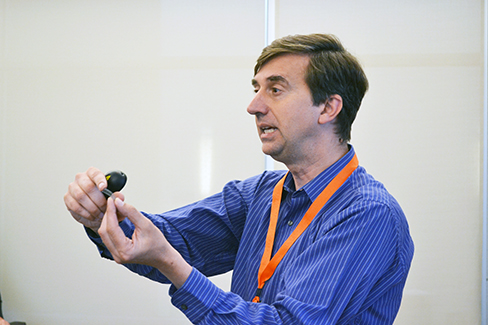
Joe Muskin explains the property of Nitinol to teachers in his session at the 2nd Annual Beginning Teacher STEM Conference. An alloy of nickel and titanium, Nitinol is a memory metal whose shape can be changed; however, when placed in hot water, it returns to its original shape.
If you make the rounds of campus outreach very often, you will soon discover that one of the constants in the STEM-education-outreach universe is Joe Muskin. Education Coordinator for Mechanical Science and Engineering (MechSE), Muskin is an outstanding ambassador, both for his department and for the University. A tireless, creative teacher, he’s come up with innovative ways to communicate the material he’s teaching for the countless STEM education activities he’s been involved in. From teachers, to current Illinois students, to high school students, to elementary (and even pre-school) students, he’s broadened the knowledge of those he’s worked with about specific areas of engineering as well as STEM outreach. Regarding long-term impacts, he’s helped to pique participants’ interest in engineering and STEM education/outreach and has helped to recruit students into engineering, STEM, and to Illinois.
Muskin acknowledges that his goals in STEM education and outreach are not just to recruit needed manpower into STEM, but to show how enjoyable it can be: “STEM outreach is so important, not only do we need more involved in STEM fields, but many people find these endeavors very rewarding! We want to make sure everyone knows what a career in STEM might feel like so they can decide if it is something for them. Too many people don’t realize the fun, creativity, and excitement in STEM.”
What he finds particularly rewarding is “seeing a student’s face light up as they work with tools and ideas they didn’t think they had the skills to work with. I really get a lot of joy seeing students realize they can do really fantastic things.”
Even more fulfilling is seeing the long-term results of his efforts. “But perhaps the most rewarding is when I run into someone I had worked with years ago and see that they are now heavily involved in STEM. Seeing students go into college, graduate, and work in industry or academia in the STEM fields really makes it all worthwhile.”
Part of what makes Joe Muskin so great at discerning what schools, teachers, and students need is that he was in the trenches himself. He served as a middle school science teacher at Next Generation School in Champaign prior to arriving on campus, where he has been involved in education/outreach for several centers, grants, and departments.
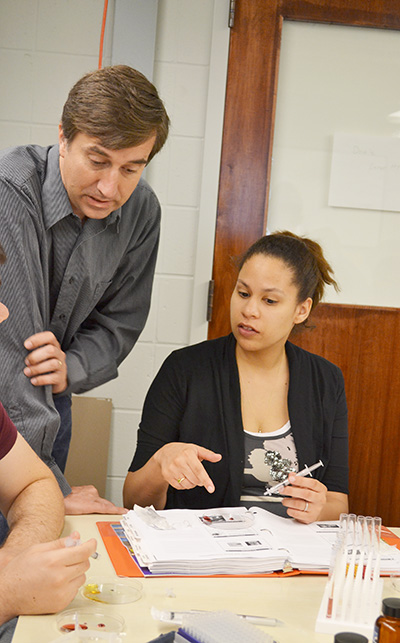
Joe Muskin works with a teacher during an EnLiST workshop on gold and silver nanoparticles.
For instance, at Nano-CEMMS (the Center for Nanoscale Chemical-Electrical-Mechanical Manufacturing Systems), Muskin and his crack team were involved in a wide variety of Stem Education events. Day in, day out, like a well-oiled machine, he and his staff routinely exposed the public to some of the university’s exciting, cutting-edge research housed in the center.
Joe has also been involved with the nano@illinois RET and REU, and is currently working with the NSF-funded POETS (Power Optimization for Electro-Thermal Systems) Engineering Research Center and iRISE (Illinois partnership for Respecting the Identities of Students in Engineering). In his current position in MechSE as its Education Coordinator, Muskin has continued to exhibit his modus operandi: STEM education outreach comprised of engaging, hands-on activities, often involving cutting-edge research.
Hands-on lessons. In most of his roles since coming to Illinois, one key responsibility has been to come up with hands-on activities. Joe never met a hands-on activity he didn’t like, whether it be a tried-and-true one or a brand new one fostering emerging new technologies. And having taught middle school science for many years, his trademark, inquiry-based science and engineering lessons appeal to and may be adapted to students of all ages. While a setting might call for a certain activity, such as 3-D printing, he has the knack of taking that activity and tailoring it to appeal to the age/knowledge-level of the classroom or group of students involved in a given setting.
Venues. Joe is comfortable teaching in a variety of educational settings that vary in location and length of time. Activities might be on campus and last for a week, such as summer camps or professional development trainings for high school science teachers. They might be campus events ranging in length from two days to one day, to a few hours, such as open houses, a one-day presentation at a WYSE camp, or workshops. Or the activity might be at a school and last for an hour or two, such as a science fair, a STEM night, or a school visit Joe makes by himself to conduct outreach activities with groups of students, such as an activity for a specific glass during its time period.
What does a week in the life of Joe Muskin look like? It might involve conducting on-campus, professional development/workshops for science teachers from around the state.
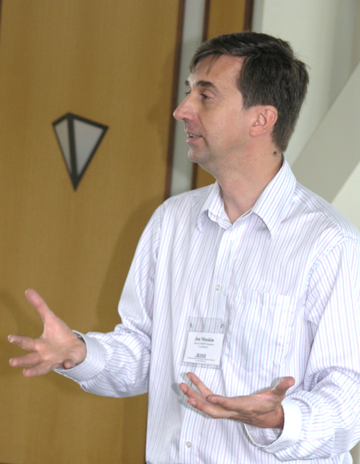
Joe Muskin sharing his passion for science with Edison Middle High School students during an iRise outreach event.
Teachers. Rather than a two-hour lecture, Joe’s method is to get teachers excited about STEM education via having them participate in engaging, hands-on activities which they can then share with their classrooms. For instance, in July of 2014, Joe taught a workshop at the 2nd Annual Beginning Teacher STEM Conference which targeted 100+ new teachers from all over the state. During his workshop, Muskin introduced teachers to an activity kids will always remember—working with the memory metal, Nitinol, whose shape can be changed but when it’s placed in hot water, it returns to its original shape.
One activity on Joe’s calendar might involve helping teachers participating in POETS’ RET (Research Experience for Teachers) prepare and deliver innovative curriculum to their students. As POETS’ Education Coordinator, he’s been collaborating with a team of four local science teachers who’ve been tasked with creating a multi-week unit related to power, heat, and power density that’s aligned with Illinois’ Next Generation Science Standards. By helping teachers develop engaging curriculum that exposes students, many of them underserved, to cutting-edge technologies, he’s helping to broaden the engineering education for numerous local students.
For instance, in 2017, David Bergandine’s chemistry students at University Laboratory High School (Uni High) did multidisciplinary research projects about heat pipes. As part of the lesson, students tested twelve different variables about heat pipes, and in the process, learned a great deal about heat flow and heat transfer. The lesson was born when Bergandine and Muskin visited a professor who was using a heat pipe to cool electronic circuitry. “Oh, that’s interesting,” they thought. “Maybe we can try to build one and see if it would work?”
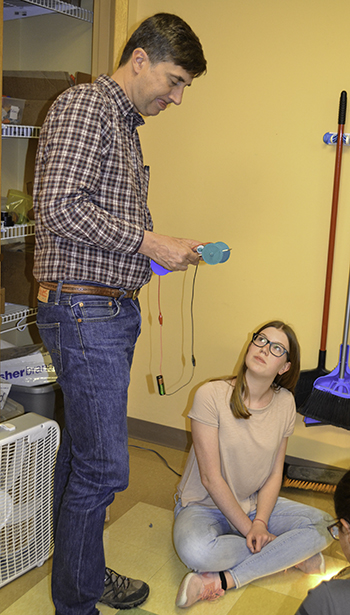
Joe Muskin helps a student test her team's solar car.
Another POETS RET-developed curriculum involved local 8th graders building solar cars. In spring of 2017, eighth graders at Uni High in Urbana and Next Generation School in Champaign spent weeks designing solar cars, then testing them to see if they would move when exposed to bright light. Integrally involved with the curriculum development and testing, Muskin claims the goal was to “create a well-designed unit in which students problem solve, design, and engineer…We also want them to have fun and to see what engineering is really like—how it is a creative field where people invent new things to solve interesting problems!”
Joe has also been involved with several other RETs (Research Experience for Teachers), including the nano@illinois RET.
Many relationships Joe’s built with teachers have turned into long-term collaborations. For example, Kim Wright, a Danville Lutheran science teacher had participated in a Nano-CEMMS teacher institute in 2010, and when Joe had encouraged participants to consider the Center to be a resource for them, she took him at his word. In 2013, as a reward for six 5–8th grade students’ doing well on the compound microscope unit, she contacted him then brought them on a field trip to Illinois to experience a Scanning Electron Microscope (SEM) and to learn how to use 3D printers.
Fostering STEM Ed Outreach. Meetings that appear regularly on Joe’s calendar are those with students regarding outreach with community groups, engineering clubs, STEM fairs, or in school classrooms. He has inculcated a love of engineering outreach into students ranging in levels from graduate students to undergrads, even down to elementary students working with younger students as well as the public.
For instance, Muskin has had a significant impact on Engineering grad students’ passion for outreach by helping to design an innovative graduate course. Working with iRISE, he teamed with MechSE faculty to teach the ME598, Sustainable Engineering Outreach course in Spring 2017. During the course, 16 Engineering grad students learned about:
- issues of power, privilege, and identity related to STEM education and outreach;
- the benefits, challenges, and rewards of engineering educational outreach; and then
- put into practice what they’d learned with some local high school students.
As part of the iRISE-Centennial High AVID partnership, both the Centennial High students and their iRISE grad student mentors presented their projects featuring motor-controlled wheelchairs at the Pygmalion Arts Festival in September 2017. Extremely excited for the general community to see what his students had accomplished, Joe Muskin indicated that the collaboration benefitted both the high schoolers and grad students.
Plus, as a continuation of last year’s iRISE/AVID students’ wheel-chair design projects, in 2018, Joe will be helping AVID students redesign and form a business plan for their products.
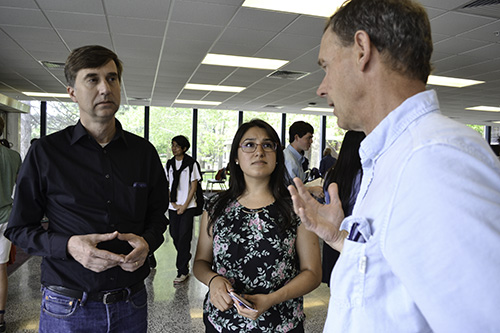
Left to right: Joe Muskin and Jessica Perez converse with David Bergandine about his students' research projects.
Joe often serves as a mentor for both grad and undergrad students wanting some experience in STEM education outreach or who have come up with a brainchild they want to try out. For instance, when MechSE grad students Matt Milner and Ashley Armstrong decided to start a grad student outreach group, ENVISION, Joe took the two under his wing, gave them advice, and helped them network. Then, along with the Booker T. Washington principal, he helped them plan the first-ever BTW engineering fair, a win-win both for both the BTW students, parents, and Illinois student volunteers. ENVISION is now a staple at many local outreach events.
When it comes to helping students’ dreams be fulfilled, Joe is not afraid of a challenge, such as an outreach to students in a rural school, like Philo’s Unity East. So when iRobotics' Arsalan Aslam expressed an interest in reaching out to a rural school because they are often overlooked and their students short-changed, Muskin agreed. “We wanted to make efforts to fix that problem,” he acknowledged. So in April 2014, Muskin and iRobotics and Pi Tau Sigma leaders planned the school’s first-ever Engineering Night. The night's activities addressed a range of engineering disciplines: civil and mechanical engineering and even physics while Muskin and a team of Illinois students from MechSE, the iRobotics student organization, and Pi Tau Sigma, a mechanical engineering honor society, served as proctors for the different stations.
He might be making an on-site visit to a local school, with an undergrad protégé in tow. When MechSE senior Nathan Dostart wanted to convince elementary to add “engineer” to their list of possible careers, Muskin arranged for him to spend some mornings at Stratton School in Fall 2013. With Joe’s help, Dostart did several hands-on activities with Zanne Newman’s fourth graders, in the hopes that some might end up saying, “‘I want to be an engineer.’ I think it would be really cool,” Dostart adds.
Joe isn’t above a twofer—using outreach to expose youngsters to engineering AND to introduce another group of students to the rewards of STEM outreach. For instance, in February 2016, garbed in rubber gloves and protective goggles, Next Generation School (NGS) eighth graders on a field trip to BTW shared the art of making bouncy balls with its kindergarteners. According to NGS teacher Bryant Fritz, it was a win-win for both groups. His eighth graders experienced working with young children and taking principles they’ve learned down to a level younger students can understand. BTW youngsters were exposed to lab principles, scientific equipment, and, of course, ended up with a ball that they had made all by themselves. And they all had fun.
In another twofer, Muskin helped train NGS 6th–8th grade students who participated in NanoDays, a program offering unique hands-on learning experiences about nanoscale science. Muskin also helped supervise the two-day event, held at the Champaign Public Library on Friday, April 4th, 2014, and the Orpheum Children's Science Museum on Saturday, April 5th. NGS students demonstrated to visitors the unique properties of nanoscale materials. Besides learning a lot about nanoscience, the students also learned to adapt their presentation for not only their peers, but an audience ranging from preschoolers to adults.
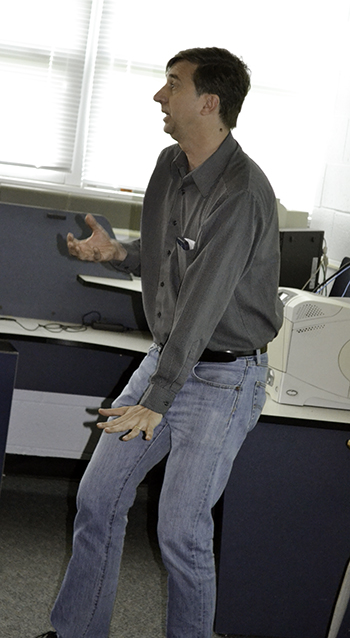
Joe Muskin explains how TinkerCAD works to a class of Jefferson Middle School students.
To help schools expose their students to emerging technologies, Muskin isn’t afraid to get his hands dirty. In fact, in 2015, when a number of the local middle school teachers who had just gotten 3D printers in their classrooms but weren’t sure how to use them approached Joe Muskin, he teamed up with ECE grad student Kitt Peterson to develop a curriculum that introduces rapid prototyping to sixth graders. So during the 2015–2016 school year, around 90 middle school students at Jefferson, Franklin, and Edison Middle Schools learned how to use TinkerCAD, a free, online software, then designed key chains, which were then 3D printed.
High School Students. Joe Muskin has had a significant impact on numerous high school students trying to settle on a college/career path. Through his activities, he teaches not only them what engineering is about, but has no doubt recruited a number of students to both engineering and Illinois as they have “Aa-ha” moments. He’s regular at a variety of outreach events for high school students, including summer camps like GAMES, with its emphasis on increasing the number of women in engineering and WYSE, which exposes students to numerous engineering disciplines, including Mechanical Engineering.
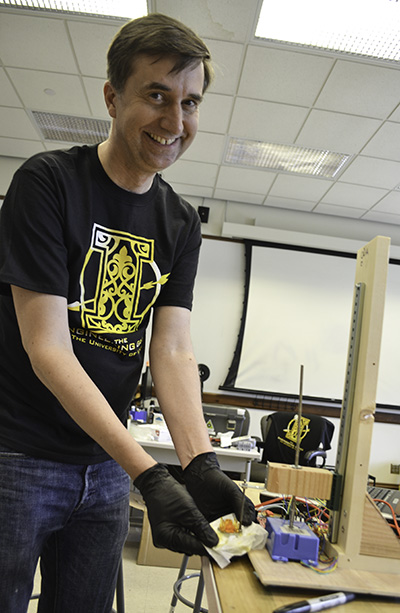
Joe Muskin shows off a 3D printed object one of the GAMES campers made on the 3D printer they designed and built..
Joe is passionate about his role as one of the co-directors of the G-BAM (Girls Building Awesome Machines) GAMES camp, and in his fifth year with the camp, along with other MechSE faculty coordinators, has worked tirelessly to help revamp the curriculum, ensuring that students are exposed to some of the cutting-edge research going on at Illinois and that they have challenging, engaging design projects.
Similar to G-BAM, but co-ed, MechSE's WYSE (Worldwide Youth in Science & Engineering) Camp, Exploring Mechanical Engineering, also helps high school students do just that. Most of the campers at this perennial camp are pretty much set on careers in engineering…They’re just trying to figure out in which discipline. And MechSE’s WYSE camp appears to have the potential to assist them in their decision-making process. So Joe and his colleagues spend the entire week exposing campers to some of the fun stuff in mechanical engineering.
In another recruiting scenario, Muskin does his part to woo prospective students to MechSE and Illinois during the MechSE High School Visit/Open House. For instance, during the Fall 2014 event, he manned an exhibit which gave visitors the opportunity to do some hands-on rapid prototyping.
Joe serves as an excellent University-community liaison, helping to disseminate information about innovative research going on in MechSE through various grants. Because he’s aware of both MechSE faculty and students’ strengths, he often serves as a liaison to connect faculty and schools. He’s arranged numerous win-wins—facilitating opportunities for MechSE faculty and their students to expose local youngsters to their cutting-edge research.
For instance, in October 2014, Muskin arranged for MechSE Assistant Professor Gaurav Bahl to introduce Sharlene Denos' Uni High engineering class to his research on opto-mechanics. Like Muskin, Bahl also believes university folk should get outside the four walls of their labs and impact the community. Plus, he's passionate about mentoring students, especially undergrads. So when he shared his expertise with some seniors at Uni High, he invited a couple of his students to tag along to share what they know and to experience outreach for themselves.
When faculty come up with an idea, Joe helps their dream become a reality. For instance, when Mattia Gazzola came up with the Paper2Tree program, Joe helped Gazzola’s vision come to pass by helping to recruit other faculty and plan outreach activities in the two partner schools, Martin Luther King Booker T Washington STEM Academy, for the kickoff event highlighting the new MechSE program.
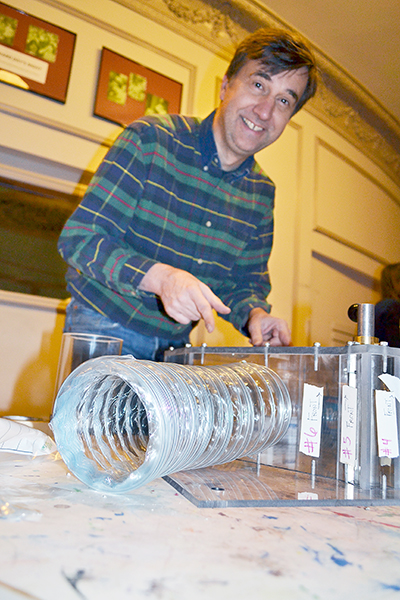
Muskin explains how the control box the machine shop built for the Wind Maze project works.
Muskin doesn’t just serve as a liaison between MechSE faculty and students and schools. For instance, when Sharlene Denos’ senior Engineering Class at University Laboratory High School (Uni) designed and built a Wind Maze for Champaign’s Orpheum Children’s Science Museum in Fall 2014–Spring 2015, Muskin approached Clifford Gulyash, who heads up MechSE’s Machine Shop, and a few of his cohorts to work with the high school students. Like Muskin, Gulyash would like to see the students attend Illinois. “I want ‘em to come back next year,” says Gulyash, who sees his machine shop as one component of the recruiting process.
Joe also has his finger on the pulse of what schools want and need, and often jumps in the trenches with them. For instance, when the founder and head of Foundations 4 Advancement Christian College and Career Readiness Academy in Chicago wanted to expose her students to the University, Joe Muskin helped to arrange a variety of hands-on activities for their one-day campus visit.
When schools/teachers want some outreach, they know just whom to call: Joe Muskin. For instance, when Ryan Cowell, the principal at Booker T. Washington STEM Academy (BTW) wanted to start a Family Engineering Fair, he immediately sought out Joe Muskin to get the ball rolling. “I think that night I went to Joe,” Cowell reports, “and I said, ‘Hey, what do you think?’ He, of course, is up for anything. He thought that was a good idea, and it started to roll from there.” So with the help of Joe and some of the MechSE students he got involved, on Saturday, April 23rd, 2016, BTW held its first annual Family Engineering Fair.
Story and photographs by Elizabeth Innes, Communications Specialist, I-STEM Education Initiative.
More: Champaign-Urbana Community, Faculty Feature, MechSE, Undergrad, Undergrad Education Reform, 2018
For additional I-STEM articles highlighting some of Joe Muskin’s STEM Education Outreach in campus, please see:
- Joe Muskin & Team: Nano-CEMMS' Ambassadors for STEM Education
- Beginning Teachers Add to Their Hands-On Repertoire at INTC STEM Conference
- Danville Teacher Partners with Illinois To Expose Students to STEM
- Uni High Students Research Heat Pipes as Part of POETS’ RET Curriculum Development
- Local 8th Graders Build Solar Cars Courtesy of POETS' RET
- Engineering Grad Students Introduce High Schoolers to Engineering Via IRISE
- Centennial High AVID Students Present iRISE Engineering Projects at Pygmalion Festival
- MechSE Grads Milner & Armstrong Trade in Sports Outreach for STEM Via ENVISION
- MechSE's Dostart Hopes to Influence Local Youngsters to Choose Engineering
- NGS Students on the Ball Teaching BTW Kindergarteners About Polymers
- Memory Metal to Oobleck: NanoDays Makes Learning About Nanoscience Fun
- ECE's Kitt Peterson Exposes Local Middle Schoolers to Rapid Prototyping
- Cowell, BTW's Family Engineering Fair Sends a Message: STEM = Fun
- Mattia Gazzola’s Paper2Tree: A 3-Step Program to Give Back to Your Community: Publish a Paper ➜ Plant a Tree ➜ Perform a School Outreach
- Gulyash, MechSE Machine Shop Solve Problems, Save Money…and Recruit
- Local Youngsters Experience Unity East's First-Ever Engineering Night
- 2015 nano@illinois RET Teachers Perform Nanotechnology Research, Make Modules
- Open House Showcases MechSE for Prospective and Current Students
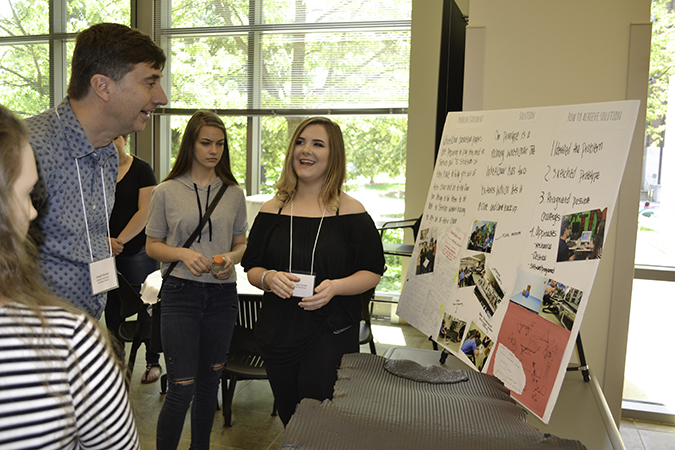
MechSE's Joe Muskin (upper left) interacts with a Centennial student as she explains about her team's research.













.jpg)
















